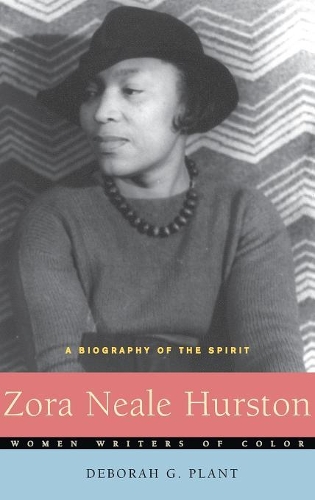
Zora Neale Hurston: A Biography of the Spirit
(Hardback)
Publishing Details
Zora Neale Hurston: A Biography of the Spirit
By (Author) Deborah G. Plant
Bloomsbury Publishing PLC
Praeger Publishers Inc
30th August 2007
United States
Classifications
Tertiary Education
Non Fiction
813.52
Physical Properties
Hardback
264
Width 156mm, Height 235mm
567g
Description
This new biography takes into account the whole womannot just the prolific author of such great works as Their Eyes Were Watching God , Moses, Man of the Mountain, Jonah's Gourd Vine, Mules and Men, as well as essays, folklore, short stories, and poetrybut the philosopher and the spiritual soul, examining how each is reflected in her career, fiction and nonfiction publications, social and political activity, and, ultimately, her death. When we ask what animated the woman who achieved all that she did, we must necessarily probe further. Not one of the other existing biographies discusses or analyzes Hurston's spirituality in any sustained sense, even though this spirituality played a significant role in her life and works. As author Deborah G. Plant shows, Zora Neale Hurston's ability to achieve and to endure all she did came from the courage of her convictionsa belief in self that was profoundly centered and anchored in spirituality.
Reviews
Part reference book, part intellectual biography, part passionate defense, this release in the Women Writers of Color series concentrates more on Hurston's art and less on her life than does Valerie Boyd's Wrapped in Rainbows: The Life of Zora Neale Hurston (2003). Plant's approach, which is accessible without being simplistic, complements that of Carla Kaplan in her eponymous edited collection of Hurston's letters (2003). Plant vaults between levels of formality, but this ingenious method bears fascinating fruit in her bravura account of the plot of Their Eyes Were Watching God, told, as in the novel, from Janie Crawford's point of view. Plant takes particular note of Hurston's unpublished work on Herod the Great, long neglected by Hurston scholars. Though her treatment of that work is a bit diffuse, Plant convincingly demonstrates the Herod project's pertinence, particularly in any revision of Hurston's later years. Plant's explanation of Hurston's alleged improvidence--that she believed money was to be spent to gain experience--gives insight into Hurston's creative soul. Also valuable are Plant's interviews of readers and advocates of Hurston's work, material that shows the reader why Hurston still resonates in the 21st century. Recommended. Lower-division undergraduates and general readers. * Choice *
Plant.adds new dimension to the body of biographical literature already published, earnestly portraying Hurston's vitality and spirituality, characteristics that enabled her to achieve innumerable accomplishments.An inspiring read recommended for all libraries. * Library Journal *
Plant relies on previous biographies as well as interviews and correspondence with Hurston's friends and colleagues, to offer a portrait of a woman with an eclectic and searching sense of the spiritual in everyday life. Plant also explores the religious images in Hurston's work, the characters based on her own father, a preacher, and Hurston's understanding of the Baptist Church as well as other beliefs, including the voodoo practices of the West Indies. Hurston's appreciations of the transcendent in common people, her curiosity, and her own self awareness blended into an appreciation of the soul source that guided her life and her work. This is a compelling look at another side of one of the most significant literary figures of the Harlem Renaissance and American literature. * Booklist *
A biography of writer Zora Neale Hurston, this volume focuses on her spirituality as a driving force and how it was reflected in her academic career, fiction and nonfiction, sociopolitical activity, and professional career. Plant (Africana studies, U. of South Florida) also discusses her spiritual legacy in institutions, works, curricula, performances, and festivals created in Hurston's honor. She considers her spiritual views and beliefs and her life and career in this context, drawing on Akasha Gloria Hull's concept of spirituality as containing the following aspects as a means for taking part in struggle: political and social awareness, eclectic spiritual consciousness, and enhanced creativity. The volume is for both general readers and scholars. * Reference & Research Book News *
Author Bio
Deborah G. Plant is Associate Professor of Africana Studies at University of South Florida, author of Every Tub Must Sit On Its Own Bottom: The Philosophy and Politics of Zora Neale Hurston.
